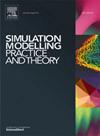Joint optimization of offloading strategy and resource allocation for multi-user in dynamic vehicular edge computing systems
Abstract
Internet of Vehicles (IoV) relies heavily on its computing capability to facilitate various vehicular applications. Since the cloud computing or mobile edge computing (MEC) only cannot satisfy the latency requirement due to the limitation of the resource coverage, the cloud–edge-end cooperative computing has become an emerging paradigm. A comprehensive IoV architecture is considered and a joint optimization problem is formulated to minimize the system function value. To optimize the resource allocation and the task offloading strategy, the simulated spring system algorithm (SSSA) is designed where the initial problem is decoupled into two sub-problems with priority. The first one is to allocate computing resources based on KKT conditions, thus the individual optimal solution is achieved. The second one is solved based on the idea of simulated spring system such that the task offloading strategy is obtained. Two sub-problems iterate mutually to update each other until finishing the binary tree traversal. Thus, the proposed solution adapts to various conditions and the computational complexity is also reduced compared with traditional methods. Simulation verifies that the proposed algorithm reduces the maximum system function value by about 31% compared with the benchmark methods and performs efficiently in various road conditions.

 求助内容:
求助内容: 应助结果提醒方式:
应助结果提醒方式:


